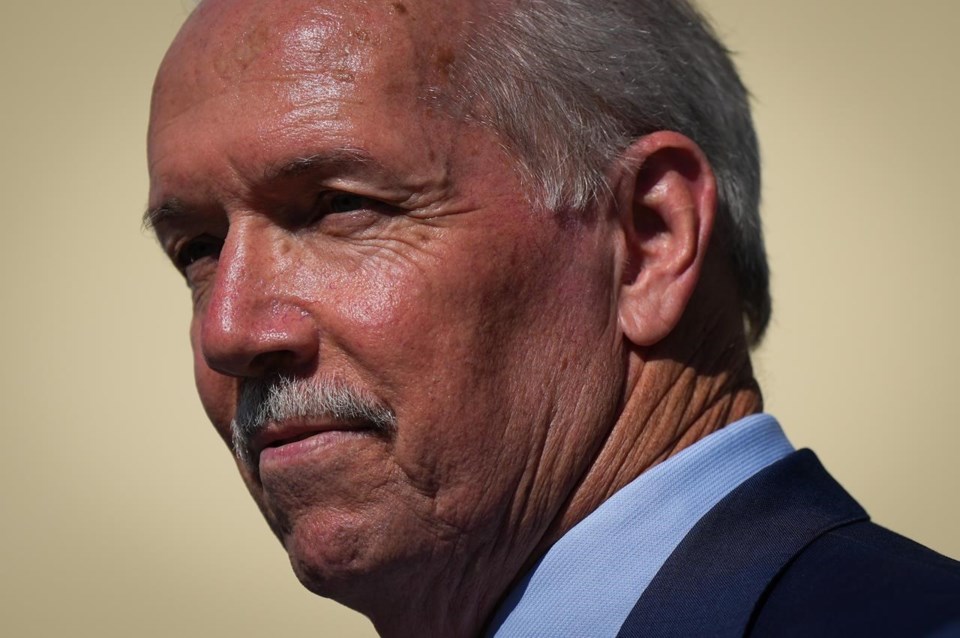LANGFORD, B.C. — The British Columbia government says it will tackle rising costs of food, fuel and other necessary goods with a series of targeted relief measures that include increased tax credits and family benefits worth $600 million, along with a cap on rent hikes at two per cent.
Premier John Horgan announced the support measures Wednesday at a news conference held on a soccer pitch in his home riding where school students were playing in the background.
The premier said inflation in B.C. and globally is driving up costs for families and the government's measures will offer a cushion during challenging times.
Starting next month, about 85 per cent of people in B.C. will benefit from the government's increase in the Climate Action Tax Credit payment, estimated to be worth up to $1,500 a year for a family of four, Horgan said.
The B.C. Family Benefit, formerly known as the province's Child Opportunity Fund, will provide increased tax-free monthly payments to about 75 per cent of B.C. families with children under 18, he said.
The family benefit will be a temporary measure, running from January to March, but the increase amounts to $58 a month for a single parent with one child, Horgan said.
The actions are aimed at helping people who are hurting from the rising costs of goods and services, said Horgan.
"And so, by targeting these resources, we're helping the people that need it the most," he said. "That's been our choice. Other jurisdictions have made similar choices, others have made different choices."
"But ultimately, we believe that this is a fair package that will meet the needs of people in the short term," he said.
Horgan said the government is also planning to provide residents with a benefit on their power utility costs later this year, but he did not elaborate on what could be expected from the Crown-owned BC Hydro.
The government said last month it was preparing to introduce a series cost-of-living initiatives, starting with a $60-million education affordability fund to ease the burden of back-to-school costs.
The fund will expand school meal programs and help families pay for supplies and field trips in an effort to take the sting out of added school costs.
Earlier this year, the Insurance Corp. of B.C., the province's Crown-owned automobile insurance provider, gave vehicle owners $110 rebate cheques to offset high fuel costs.
Horgan acknowledged the government's decision to hold rent increases to two per cent for 2023 instead of the rate of inflation will concern landlords.
He said the government will consult with landlords about the rent cap, but at this time the government decided people need to know their rents can only increase by two per cent.
"We have a short-term crisis, quite frankly, and 1.5 million British Columbians who rent will benefit immediately," Horgan said.
A spokesman representing 3,300 B.C. landlords called the two per cent cap on rents "concerning and disappointing."
David Hutniak, LandlordBC chief executive officer, said landlords are facing the same rising costs as B.C. residents, with their building insurance costs, property taxes and utilities all increasing.
"If we don't start finding some workable solutions, it is really going to put the entire rental housing ecosystem in serious jeopardy," he said in an interview. "It's already in trouble but it's just going to get exacerbated."
Finance Minister Selina Robinson foreshadowed the government's cost relief plans last month when she delivered last year's final budget numbers, which included a surplus of $1.3 billion after earlier projections of a deficit nearing $10 billion.
Green Leader Sonia Furstenau said the measures will only provide short-term relief to people in B.C.
"For too long, our leaders have believed in one-off rebates that fail to address systemic challenges that British Columbians are facing and have failed to invest in our crumbling services."
She called for long-term investments in programs for housing, food security, health and transit.
This report by The Canadian Press was first published Sept. 7, 2022.
Dirk Meissner, The Canadian Press



